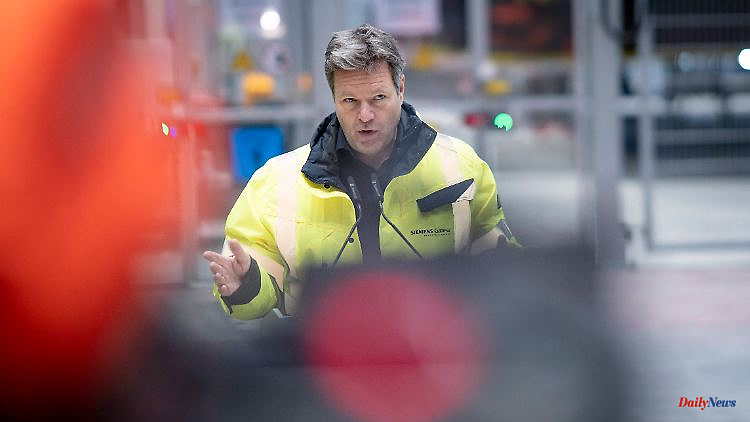Robert Habeck is visiting Markus Lanz and of course he is also supposed to answer the frequently asked question about further arms deliveries to the Ukraine. The Green politician draws a red line for fighter jets and submarines. But Habeck is actually Minister for Economics and Climate Protection, and that's what the show is about.
Federal Economics Minister Robert Habeck spoke out against the delivery of submarines and combat aircraft to Ukraine. It was right that Germany wanted to deliver battle tanks to the country at war, said the Green politician on "Markus Lanz". Ukraine needs reinforcements on the ground. "That's why the tanks have to get to Ukraine quickly. But I don't think much of the current debate about combat aircraft and submarines. That's not what's on the agenda now," said Habeck. For the modern fighter jets, Ukraine will need the maintenance of the West. "I don't think it's right to deliver combat aircraft. Generally not. For what we can now see, aircraft would be the wrong decision," Habeck said on ZDF.
The war in Ukraine overshadowed the development of the economy in Germany, Habeck stated later in the program. It was clear from the outset that the sanctions against Russia and the Russian response to them would affect the economy. But: "We got through surprisingly well," says the minister happily. Last summer, the economic institutes predicted a 12 percent slump in the economy. Instead, there was growth of 1.8 percent.
But Habeck also knows that in addition to the Ukraine war, Germany will face other problems, above all the transformation of the energy industry. With the "Inflation Reduction Act" the USA also switched to an environmentally friendly energy policy, but at the same time paid high subsidies to companies that produce there. This could also cause German companies to migrate to America.
The German economy must now decide what the future markets are and then remain disciplined. "Discipline means taking the competition full volley. And the competition will take place via the green lead markets." Furthermore, the economy must be financially supported by the federal government. They have already "laced up big programs" that now have to be spent. But: "You can certainly add a shovel here and there."
The most important project for Habeck, however, is: "We have to approve faster." Habeck criticizes that many decisions are no longer made politically, but legally and through administrative channels. This applies in particular to the energy transition: "We don't have to do everything, but what we do, we have to do quickly."
And it is precisely on this point that things seem to be going wrong in Germany. Wind power expert Johannes Lackmann, who planned the first community wind farm near Paderborn back in 1994, describes it like this: If you want to build a wind farm, you first have to obtain a large number of reports, which could fill 140 folders. Among other things, it must be noted that the system should not be seen from a listed church tower. "But one of our main handicaps is nature conservation," he says. Because if the permit for the wind turbine was there after several years, the nature conservation association would come and sue the operator. "NABU often cannot even prove that we are threatening or endangering species. Nevertheless, there are complaints. That's what I call abuse of association law." The energy transition protects endangered species. "In the environmental movement there used to be a motto: think globally, act locally. Today it's: talk globally at conferences, prevent locally. That's a catastrophe."
However, Habeck promises that something will soon change in the area of species protection. "We need a system where the wind millers have a great interest in the species prospering." That is why the federal government wants to dispense with processes when examining species protection in the future. This would save the wind millers money for hiring surveyors, which they in turn should invest in protecting endangered animals. This regulation should be implemented this year.












